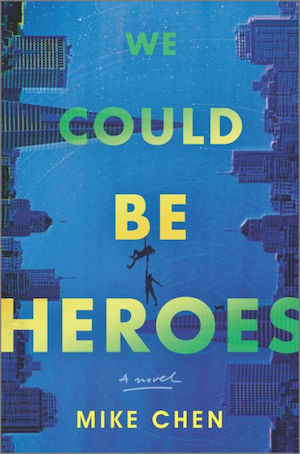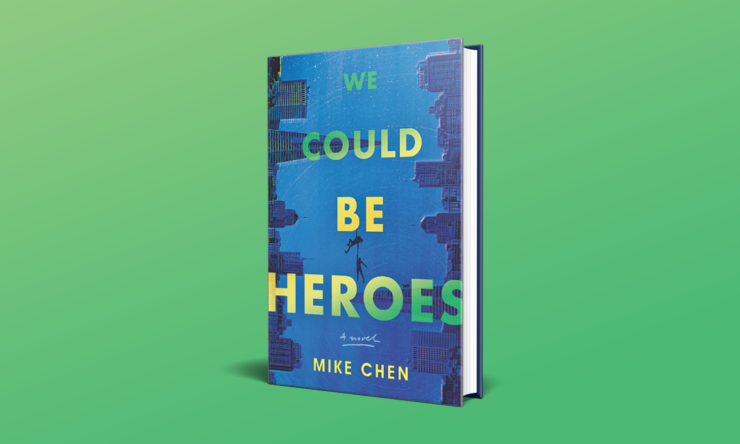In San Delgado, the public eye has focused on two super-powered individuals, each making a name for themselves with feats of daring-dos and don’ts. The Mind Robber, infamous for his ability to erase memories, has been on a spree of bank robberies. Throwing Star, with her super speed, strength, infrared vision, and durability, has been on his trail.
But out of the spotlight, Mind Robber and Throwing Star are both amnesiacs who woke up one day two years ago with powers and no idea of who they are. Jamie Sorenson is only robbing banks so he can take his cat, Normal, and find an island to get away to for good. Zoe Wong is hunting him in between day drinking and fast-food delivery, her sense of purpose and self-worth eroding day by day. When these two powered people run across each other in a help group for people with memory and cognitive issues, Mike Chen’s excellent third novel, We Could Be Heroes, really kicks into gear.
Chen, known for his first two novels Here and Now and Then and A Beginning at the End, is a writer that effortlessly takes lofty concepts and whittles them down to reveal the human stories within. This novel could easily have been the psychological ramifications of messing with a person’s mind, and how taxing it can be to live a super life in a world of regular people. Instead, Chen deftly maneuvers his characters and his stories to be about human issues: identity, belonging, self-worth, self-awareness, guilt, and redemption are just some of the many currents running through this book. In some ways, the superheroics in this book are not the focus (though Chen does write a good action sequence) but are often more of a side effect of larger stakes.
Buy the Book


We Could Be Heroes
Jamie and Zoe are two well-drawn characters, and even with the challenge of not knowing who they are themselves, Chen does a wonderful job of telling us as the story unfolds. An added benefit to exploring their relationship is that since neither really knows themselves, the reader and the characters are finding out about them at the same time, surprising themselves with lines they won’t cross, or proclivities they didn’t know they had until they figure them out in the moment. For all his theatrics, Jamie is actually not that bad of a guy (I heard Zangief from Wreck-It Ralph a lot; “Just because you are bad guy doesn’t mean you are a bad guy,”). He’s persnickety and has a hair-trigger paranoia about him, but ultimately doesn’t want to hurt anyone; he just wants to escape his circumstances. Zoe is adventurous, grumpy, but well-meaning while also being a little unpredictable and prone to bad impulses; turns out, when you have super-powers, you don’t tend to have a lot of caution. Together, they’re the classic pairing of snark and sweet, far too cautious and nah, let’s give it a whirl that have made excellent literary duos through narrative history.
And does it work? It really does. Chen infuses this story with charm, kindness, action, heroics, and enough grounding touches of humanity that reminds you that for all the bullets they can catch and all the memories they can erase, Jamie and Zoe are just people trying to figure out who they are, who they were, and ultimately as this information is gleaned, who they want to be. In the afterward, Chen lists such shows as Doctor Who, Arrow, and Legends of Tomorrow as influences on his writing and it definitely shows. There is a level of breeziness and humor, of camp and wit that sparkles throughout the book, with just enough tongue-in-cheek and knowing nods and references to make a reader grin, but not enough to detract from the momentum of the story or lower the seriousness of the stakes. The drive to do good, or try to do good, is what the story boils down to: even when our intentions are good, what happens if we screw up? What’s the cost of good intentions if enacting them has a high cost? Chen answers these serious questions and more, infusing high stakes questions of morality with his telltale humor and heart.
If there are some slight stumbles here and there, it’s only for the breathless pace Chen sets or hurdles of the story he’s telling. À la The Good Place, there are some mechanics with memory wiping that treads ground where readers have already got certain info, as characters re-learn things at times, again and again. And there is a middle chapter that has a “massive ‘villain’ monologue,” feel to it that feels like there could have been more unpacked over a longer time. But! Like I said, these feel more a part of the plot than anything, and if they slow down the already speedy story, it’s not by much and not for long.
We Could Be Heroes is a wonderful examination of humanity, relationships, identities, and how when we work together, we’re better for it. In the end, it is not the use of powers or displays of force that help Jamie and Zoe secure victory, but by extending a hand across a supposedly unbridgeable gap for each other and other characters and offering empathy to someone going through something unimaginable. In this, as the title suggests, we can all be heroes, powers or not. And I think Chen would be okay with that conclusion. This was the first of his books that I’ve had the pleasure of reading, and with more genre-bending work in the future, I’m eagerly awaiting my chance to dive back into his worlds.
We Could Be Heroes is available from MIRA Books.
Martin Cahill is a writer living in Queens who works as the Marketing and Publicity Manager for Erewhon Books. He has fiction work forthcoming in 2021 at Serial Box, as well as Beneath Ceaseless Skies and Fireside Fiction. Martin has also written book reviews and essays for Book Riot, Strange Horizons, and the Barnes and Noble SF&F Blog. Follow him online at @mcflycahill90 and his new Substack newsletter, Weathervane, for thoughts on books, gaming, and other wonderfully nerdy whatnots.










